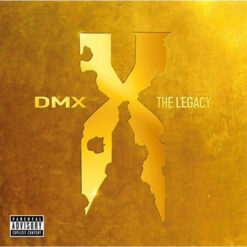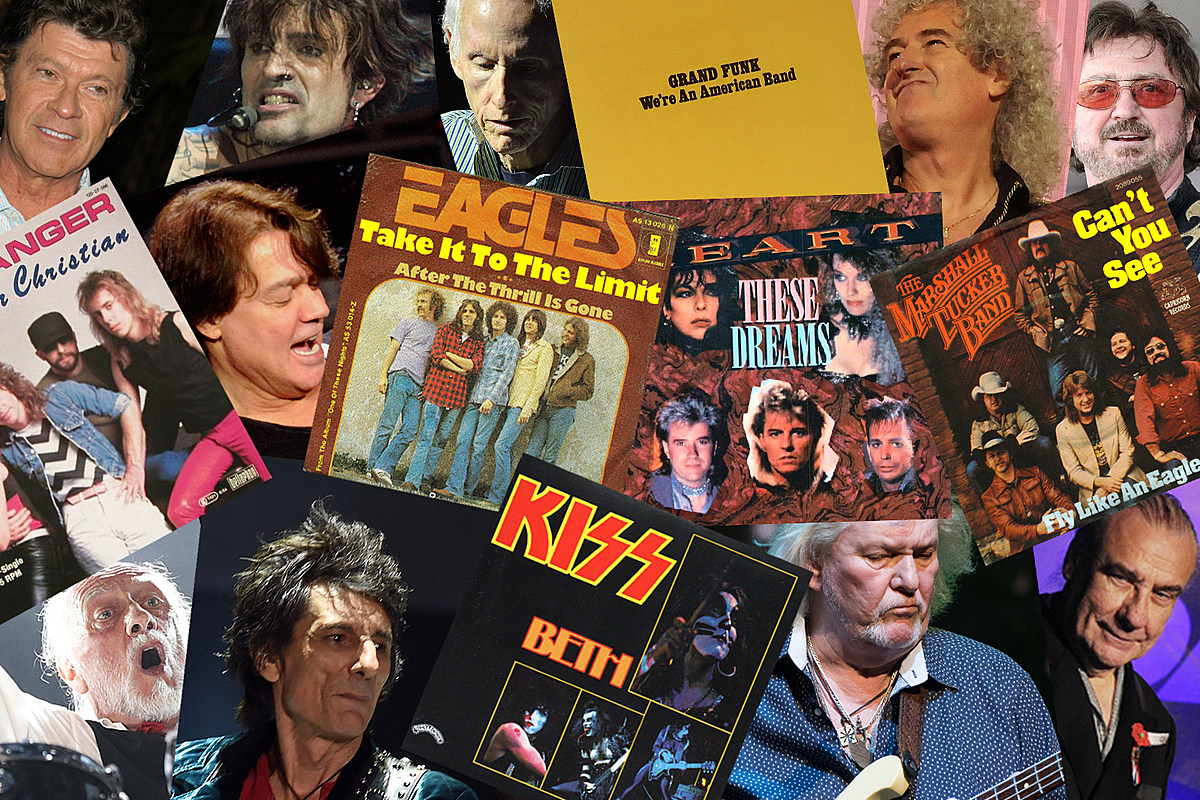-
×
 DMX "The Legacy"
1 × $45.00
DMX "The Legacy"
1 × $45.00
Classic Rock
Ranking 35 Classic Rock Songs Not Sung by the Lead Singer
Fair or not, rock groups are often closely associated with their singers. But that doesn’t mean other bandmates don’t occasionally get their due at the mic. In fact, as you’ll see in the following countdown of Classic Rock Songs Not Sung by the Lead Singer, there is more than one example where a band’s biggest hit featured vocals from somebody else. Check out those times when the frontman took a back seat.
No. 35. Van Halen, “How Many Say I”
From: Van Halen III (1997)
Eddie Van Halen said he ended up taking the lead on this unusual acoustic piano ballad in a very offhanded way. “As long as that song is, is as long as it took,” Van Halen told Doug Fox. “It just came right through me. Not to get bizarre or spiritual on you, but it was almost like an out-of-body experience.”
No. 34. Motley Crue, “Brandon”
From: Generation Swine (1997)
Touched by the birth of his son, drummer Tommy Lee wrote and sang the strings-laden “Brandon.” “Your mother gave birth to you with love inside,” Lee sings, referencing his wife at the time, Pamela Anderson. Lee subsequently quit Motley Crue; he didn’t return until 2005’s Red White and Crue.
No. 33. Fleetwood Mac, “These Strange Times”
From: Time (1995)
The first Fleetwood Mac album without Stevie Nicks or Lindsey Buckingham since 1974’s Heroes Are Hard to Find ended on a strange note, as drummer Mick Fleetwood offered an extended spoken-word piece set to jungle rhythms. Time failed to chart in the U.S., something that hadn’t happened in almost three decades, and Buckingham and Nicks subsequently returned.
No. 32. The Doors, “Runnin’ Blue”
From: The Soft Parade (1969)
The remaining Doors continued forward after frontman Jim Morrison‘s death, releasing a pair of albums in 1971-72 featuring vocals by Ray Manzarek and Robby Krieger. But that wasn’t the only time somebody else besides Morrison sang on a Doors song. “Runnin’ Blue,” the fourth and final single from The Soft Parade, also featured Krieger on vocals.
No. 31. Black Sabbath, “Swinging the Chain”
From: Never Say Die! (1978)
During a tumultuous period before Ozzy Osbourne‘s initial exit, Black Sabbath briefly collaborated with Dave Walker, who’d also worked with Savoy Brown and Fleetwood Mac. Osbourne ended up returning but old tensions unfortunately remained. He refused to sing songs they’d completed with Walker, leading to a rare turn at the mic on “Swinging the Chain” by drummer Bill Ward.
No. 30. Jimi Hendrix Experience, “She’s So Fine”
From: Axis: Bold as Love (1967)
Noel Redding’s very Who-influenced “She’s So Fine” was the first thing the Jimi Hendrix Experience worked on as sessions began for Axis: Bold as Love, their second studio project together. This was Redding’s lone songwriting contribution to the album; he also wrote and sang “Little Miss Strange” on the follow-up, 1968’s Electric Ladyland.
No. 29. Rolling Stones, “In Another Land”
From: Their Satanic Majesties Request (1967)
Bassist Bill Wyman apparently showed up for work one day only to find that the sessions had been called off. He decided to lay down a track anyway, enlisting a smart one-off group of sidemen on “In Another Land” that included regular Stones contributors Brian Jones, Nicky Hopkins and Charlie Watts, along with Steve Marriott and Ronnie Lane of the Small Faces.
No. 28. Velvet Underground, “After Hours”
From: The Velvet Underground (1969)
Drummer Maureen Tucker’s first lead vocal for the Velvet Underground happened when frontman Lou Reed wrote a song that he said was “so innocent and pure” he simply couldn’t sing it. Soon, hearing someone besides Reed singing would become far more commonplace. In fact, by the time the band called it quits with 1973’s Squeeze, none of its original members was still around.
No. 27. U2, “Numb”
From: Zooropa (1993)
This isn’t the first U2 vocal by the Edge, but “Numb” is the most famous. Released as the lead single from Zooropa, it followed “Van Diemen’s Land” from 1988’s Rattle and Hum and “Seconds” from 1983’s War, among others.
No. 26. Motorhead, “Step Down”
From: Bomber (1979)
His fame was such that many thought of Motorhead as Lemmy Kilmister‘s band. That’s how Eddie Clarke ended up singing “Step Down.” “He had been bitching that I was getting all the limelight,” Kilmister wrote in his memoir, “but he wouldn’t do anything about it. I got sick of him complaining, so I said, ‘Right, you’re gonna fucking sing one on this album.'”
No. 25. Jethro Tull, “Move On Alone”
From: This Was (1968)
The 2012 departure of guitarist Martin Barre meant Jethro Tull essentially became an Ian Anderson solo band. But early on, the group was very much a collaborative endeavor, as evidenced here. The only Tull studio track not sung by Anderson features songwriter Mick Abrahams – who did, in fact, move on alone following This Was.
No. 24. Cheap Trick, “I Know What I Want”
From: Dream Police (1979)
Tom Petersson is out front here, rather than Robin Zander, on a song that can exude such a cooly detached, almost Velvet Underground-type self-possession through the verses that Cheap Trick has been known to toss in a bit of “I’m Waiting For the Man” from Lou Reed and company during concert performances. One of those live takes ended up as the b-side to Cheap Trick’s 1988 cover of “Don’t Be Cruel.”
No. 23. Foreigner, “Starrider”
From: Foreigner (1977)
“Starrider” was written by co-founders Al Greenwood and Mick Jones for Foreigner‘s self-titled debut and features lead vocals by Jones, who would more typically cede that role to the later-departed Lou Gramm. Greenwood was with Foreigner through 1979’s Head Games, and also worked with Joe Lynn Turner.
No. 22. Guns N’ Roses, “14 Years”
From: Use Your Illusion II (1991)
A key early songwriting contributor, Izzy Stradlin moved up front just before moving out. “14 Years,” the second track on Use Your Illusion II, was one of his four lead vocals from this era (along with “Dust N’ Bones,” “You Ain’t the First” and “Double Talkin’ Jive”). Stradlin announced his departure not long after, though he memorably sang “14 Years” during a brief 2012 reunion.
No. 21. Kiss, “Beth”
From: Destroyer (1976)
So much about this power ballad is atypical for Kiss, starting with the “power ballad” part. Then there’s the lead vocal: “Beth” features drummer Peter Criss, rather than Gene Simmons or Paul Stanley, who eventually became the group’s only remaining original members. This remains Kiss’ highest-ever charting single at No. 7, followed by 1990’s “Forever” – a No. 8 hit sung by Stanley.
No. 20. The Allman Brothers Band, “Hoochie Coochie Man”
From: Idlewild South (1970)
Best known for melodic bass lines on stand-out cuts like “Whipping Post,” Berry Oakley serves as lead singer for this rumbling Muddy Waters update. It’s fitting, because Oakley had been performing “Hoochie Coochie Man” since his early days with Dickey Betts in their earlier band Second Coming. Betts would later share lead vocal duties in the Allman Brothers Band with Gregg Allman.
No. 19. The Band, “Knockin’ Lost John”
From: Islands (1977)
Principal songwriter Robbie Robertson waited six albums before stepping forward to sing a solo lead. Who can blame him? After all, the Band featured not one, or two, but three brilliant vocalists in Levon Helm, Rick Danko and Richard Manuel. Robertson only took one other lead before the group split, “Out of the Blue” from 1978’s The Last Waltz. That opened the door for a solo career about a decade later.
No. 18. Yes, “Can You Imagine”
From: Magnification (2001)
This rare vocal from bassist Chris Squire took a circuitous route to the Yes catalog. “Can You Imagine” is actually a radically reworked track from a shelved ’80s supergroup featuring Squire, Led Zeppelin‘s Jimmy Page and Squire’s longtime bandmate Alan White. They were to be called XYZ – as in eX-Yes/Zeppelin.
No. 17. Frank Zappa, “Willie the Pimp”
From: Hot Rats (1969)
The only vocal on this Frank Zappa instrumental album wasn’t provided by Zappa himself, but rather former high school buddy Don “Captain Beefheart” Van Vliet. They’d long shared an affection for R&B, while challenging and inspiring one another to push against musical conventions. You hear all of that on “Willie the Pimp,” which gave Hot Rats its title.
No. 16. Canned Heat, “Going Up the Country”
From: Living the Blues (1968)
Adapted from an old blues song, “Going Up the Country” was sung by Alan “Blind Owl” Wilson rather than Canned Heat’s frontman Bob “The Bear” Hite. Fans didn’t seem to mind: “Going Up the Country” reached No. 11, becoming the band’s highest-ever Billboard charting single. He was also memorably featured on the single “On the Road Again.”
No. 14. Heart, “These Dreams”
From: Heart (1985)
Heart scored their initial No. 1 hit with someone other than usual lead singer Ann Wilson. Sister Nancy had, in fact, already sung on some half dozen Heart songs, but this was her first-ever lead on a single. Nancy returned to the Top 40 with 1987’s “There’s the Girl,” 1990’s “Stranded” and 1993’s “Will You Be There (In the Morning).”
No. 14. Journey, “I Would Find You”
From: Next (1977)
The first singer to switch places with co-founder Gregg Rolie on a Journey album wasn’t Steve Perry. Instead, it was Neal Schon. The atmospheric “I Would Find You” was followed by the Schon-sung “Karma” later on Next. The guitarist also memorably sang “In Self-Defense” from 2005’s Generations, and on his own solo projects.
No. 13. Night Ranger, “Sister Christian”
From: Midnight Madness (1983)
Jack Blades has been featured on some of Night Ranger‘s best-known singles. But drummer Kelly Keagy wrote this song for a younger sibling – the original lyrics were actually “Sister Christy” – then sang it to a best-ever No. 5 showing on the Billboard chart. Keagy also famously fronted the band for “Sentimental Street,” another Top 10 hit.
No. 12. The Kinks, “Willesden Green”
From: Percy (1971)
The Kinks usually showcased Ray Davies on lead vocals, and occasionally his brother Dave. “Willesden Green” – which features bassist John Dalton doing a dead-on Elvis Presley impersonation – is an exception to that rule. Dalton, who left the Kinks in 1976, is referencing a popular spot for socializing during the summer months in London.
No. 11. Police, “On Any Other Day”
From: Reggatta de Blanc (1979)
The first non-Sting vocal to appear on a Police album was one of three songs written by drummer Stewart Copeland for Reggatta de Blanc. Their fights over which material would make the final track listings, and even who would sing what, became legendary. Perhaps in reference to those arguments, “On Any Other Day” begins with Copeland saying, “The other ones are complete bullshit.”
No. 10. Queen, “’39”
From: A Night at the Opera (1975)
Every member of Queen composed for the group, but Freddie Mercury tended to sing them. That seemed fair since he was, after all, Freddie Mercury. The Brian May-led “’39,” off their fourth studio effort, is one of the better-known anomalies. The song remained in Queen’s set lists for decades, though Mercury sang it in concert early on.
No. 9. The Who, “Boris the Spider”
From: A Quick One (1966)
Written on a lark while out drinking with fellow bassist Bill Wyman of the Rolling Stones, “Boris the Spider” became a staple spotlight for the late John Entwistle during concerts that most often featured Roger Daltrey on the mic. As popular as “Boris the Spider” was, however, it was actually never released as a single in either the U.S. or the U.K.
No. 8. Steely Dan, “Midnite Cruiser”
From: Can’t Buy a Thrill (1972)
Steely Dan‘s debut features the bitingly literate lyrics you’d expect but they hadn’t quite perfected their sound – beginning with the vocals. Unsure of himself, Donald Fagen brought in David Palmer for most songs, then handed “Midnite Cruiser” to drummer Jim Hodder. As Fagen came into his own, Palmer split and Hodder got back behind the drums.
No. 7. Beach Boys, “Sail On Sailor”
From: Holland (1973)
This doesn’t feature lead vocals from any of the Wilson brothers, or even Mike Love. Instead, Blondie Chaplin – a South African who was with the Beach Boys for only a couple of years – sings a track co-written by the largely absent Brian Wilson. Chaplin later reunited with Brian after collaborations with the Rolling Stones and the Band.
No. 6. Faces, “Ooh La La”
From: Ooh La La (1973)
As Rod Stewart‘s solo star rose, the Faces turned to other vocalists, including future Rolling Stones guitarist Ron Wood. He stepped forward for the title track for what would be the band’s studio finale. Faces co-writer Ronnie Lane later covered it – as did Stewart himself, in a tribute to Lane from 1998’s When We Were the New Boys.
No. 5. Grand Funk Railroad, “We’re an American Band”
From: We’re an American Band (1973)
“We’re an American Band” actually became Grand Funk Railroad‘s first No. 1 single on the birthday of their regular lead vocalist, Mark Farner. But songwriting drummer Dan Brewer is at the mic here, memorably describing some of the group’s early experiences. Brewer took a more central role when Grand Funk reformed in 2000.
No. 4. Blue Oyster Cult, “(Don’t Fear) The Reaper”
From Agents of Fortune (1976)
Blue Oyster Cult had released six singles dating back to 1972 before songwriting guitarist Donald “Buck Dharma” Roeser assumed Eric Bloom’s singing duties on “(Don’t Fear) The Reaper.” They scored a best-ever No. 12 Billboard hit. Ironically, Blue Oyster Cult wouldn’t reach the Top 40 again until 1981’s “Burnin’ for You,” also featuring Roeser on lead vocals.
No. 3. Marshall Tucker Band, “Can’t You See”
From: The Marshall Tucker Band (1973)
Doug Gray was (and is) the Marshall Tucker Band‘s singer, but their late guitar-playing songwriter Toy Caldwell stepped forward for “Can’t You See,” one of the band’s signature songs. Caldwell left the group in 1984, after the deaths of both his brothers – including Marshall Tucker Band bassist Tommy Caldwell. Toy died in 1993.
No. 2. Eagles, “Take It to the Limit”
From: One of These Nights (1975)
You’d be forgiven for thinking this was a Glenn Frey song. After all, he sang “Take It to the Limit” during countless shows after original vocalist Randy Meisner’s 1977 exit from the Eagles. In fact, this began as a Meisner solo track. Following Frey’s death in 2016, the Eagles regrouped with a lineup that included Vince Gill. He took over on “Take It to the Limit.”
No. 1. Pink Floyd, “Have a Cigar”
From: Wish You Were Here (1975)
Pink Floyd always had a deep roster of singers, from Syd Barrett and David Gilmour to Richard Wright and Roger Waters. But they couldn’t get a good take on the lyrics to this scathing critique of the music industry. Roy Harper, an English folksinger, was brought over from sessions in a nearby studio at Abbey Road, and he finally nailed it.
Classic Rock’s 20 Worst Mistakes
Counting down the worst things that ever happened in classic rock.
Gallery Credit: Nick DeRiso

